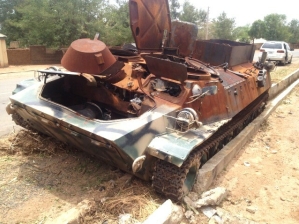
Christian leaders in Nigeria expressed shock and dismay at suicide attacks in Gwoza, Borno state on Saturday (June 29) that killed both Muslims and Christians.
“We are concerned about the resurgence of suicide bombing in our country and the threat it poses to the lives and livelihoods of Nigerians,” said Archbishop Daniel Okoh, president of the Christian Association of Nigeria (CAN), in a statement issued on behalf of Nigerian Christian leaders on Wednesday (July 3). “This senseless act of violence is a stark reminder of the evil that terrorism represents and the need for collective action to defeat it.”
Beginning with a female suicide bombing at a wedding of a Muslim couple, at least two other suicide bombings at other locations followed, killing more than 30 people and wounding many more, said Nigerian Vice President Kashim Shetim.
The two subsequent bombings on Saturday (June 29) targeted a funeral and a hospital in Gwoza, close to the border with Cameroon. No one has taken responsibility for the bombings, though Islamic extremist group Boko Haram and the terrorist group with which a faction has aligned, the Islamic State West Africa Province (ISWAP), have long been active in the area and are suspected.
Muslim victims killed during the attacks on Saturday were moved immediately to the town’s cemetery for burial, where the second female suicide bomber struck. Christians who were able to identify victims in the first blast took them and buried the bodies on Sunday (June 30).
As Boko Haram and ISWAP are motivated by a radical Islamist ideology, they treat Muslims who do not profess their view as “infidels” and target them as they do Christians.
Boko Haram’s 15-year drive to impose sharia (Islamic law) throughout Nigeria originated in Borno state, displacing more than 2 million people and killing more than 40,000.
In Saturday’s attacks, injuries reportedly included skull and limb fractures.
Okoh commended security agents for their efforts to contain terrorism.
“We encourage them not to relent in their efforts, as every necessary intervention is welcome to prevent a relapse into the dark days of suicide attacks,” he said. “We must not let down our guards, as the situation could escalate and affect not only innocent lives but also worship centers and other large gatherings.”
The president of the Church of Christ in Nations (COCIN), the Rev. Amos Mohzo, is a native of Gwoza County. He told Christian Daily International-Morning Star News that he lost some church members and relatives in the attacks.
Pastor Mohzo called for the government to make concerted efforts to stop terrorists in Nigeria.
Nigeria remained the deadliest place in the world to follow Christ, with 4,118 people killed for their faith from Oct. 1, 2022 to Sept. 30, 2023, according to Open Doors’ 2024 World Watch List (WWL) report. More kidnappings of Christians than in any other country also took place in Nigeria, with 3,300.
Nigeria was also the third highest country in number of attacks on churches and other Christian buildings such as hospitals, schools, and cemeteries, with 750, according to the report.
In the 2024 WWL of the countries where it is most difficult to be a Christian, Nigeria was ranked No. 6, as it was in the previous year.





